You can take a number of steps that help prepare your body, increase its ability to heal and reduce the risk of infection. Called prehabilitation, these steps can help you build strength, increase your physical and respiratory function, and improve your recovery after your operation. Your doctor may give you specific exercises — breathing exercises with a spirometer and leg movements — to practice in the days or weeks leading up to your surgery.
What you can do to increase your body’s ability to heal and reduce the risk of infection.
|
Good nutrition and physical fitness |
Both are important to a smooth and quick recovery. Eating a healthy diet of fruits, vegetables, and proteins can help maintain weight and reverse recent weight loss. High-calorie protein drinks between meals can be helpful if you need to gain weight. |
|
Quitting tobacco
|
Quitting smoking and other tobacco use lessens your risk for complications during and after surgery, makes cancer treatments more effective, reduces your chances of cancer recurrence, and lowers your risk of death from other causes. Roswell’s Tobacco Treatment Services offers support and services to patients: Call 716-845-1300 ext. 7851 Email: treattobacco@roswellpark.org Website: roswellpark.org/treattobacco NY Smokers’ Quitline: Call 1-866-NY-QUITS (1-866-697-8487). Online: www.nysmokefree.com |
|
Treat infections |
If you develop a cold or any type of infection before your surgery date, notify your provider. Infections anywhere in the body may increase your risk of developing an infection at the surgical site after the operation. There may be effective treatments that can be started before your surgery date. |
|
Alcohol and illegal drugs |
Avoid all alcohol and illegal drugs before your surgery. |
|
Daily exercise |
A great way to improve your conditioning before an operation. Even a 30-minute walk every other day is valuable. |
|
Breathing and leg exercises |
Practice using your incentive spirometer and doing leg exercises – they can help prevent pneumonia and blood clots after surgery. |
|
Mouth/Dental care |
Good oral hygiene and mouth care is very important. Brush your teeth 2 times a day, floss regularly, and use mouthwash that does NOT contain alcohol. Talk to your doctor/nurse about what actions you should take before surgery to prevent problems after surgery. |
Preventing pneumonia
Avoiding infection, especially in your lungs (pneumonia), is important. Coughing and deep-breathing exercises will help you clear and expand your lungs and help prevent pneumonia.
You may be given a spirometer to practice breathing exercises that your nurse will show you. If you are given one before surgery, practice using it. Use it 10 times an hour when you are awake.
Practicing these breathing exercises after surgery, too, will also help you recover more quickly.
Enhanced Recovery After Surgery (ERAS) program
Roswell Park’s Enhanced Recovery After Surgery (ERAS) program offers a better, faster recovery and the chance to get back to your normal self as soon as possible after your surgery. This program may shorten your hospital stay, avoid/minimize the use of medications (such as opioids) that may delay your recovery, and lower your risk of complications after surgery. Successful ERAS starts before the operation with medications and other therapies aimed at giving you a head-start on your recovery.
ERAS is not appropriate for all procedures and patients. You and your doctor will discuss what is best for you. If you are scheduled for an ERAS operation, your treatment center will give you a bag with the items and instructions you will need.
It is important that you follow the instructions given. While some of these before and after surgery instructions may be different from your past experiences, studies show that the ERAS program improves the recovery process. (see chart below)
|
ERAS Action |
Benefit |
|
Drinking the juice provided by your doctor/nurse, at specific times before your operation… |
helps your bowels recover after surgery and provides the nutrition you need to heal |
|
Taking laxatives soon after surgery… |
prevents constipation |
|
Starting pain medication* before your surgery… (*Taken by mouth instead of given by IV/through a vein) |
provides a head start on controlling post-operative pain, and enables you to get up and move soon after surgery |
|
Getting out of bed soon after surgery, AND Walking on day 1 after the surgery … |
helps prevent pneumonia and blood clots (called deep vein thromboses or DVTs) |
|
Starting a normal diet on day 1 after surgery… |
gives you the nutrition needed to heal faster |

